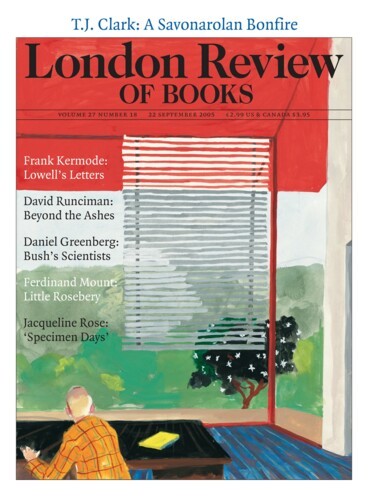It doesn’t take much to make John Humphrys angry. On the basis of his most recent book, Lost for Words: The Mangling and Manipulating of the English Language (Hodder, £7.99), it would seem that there isn’t much that makes him angrier than bad language. Not swearing – he likes swearing – but bad use of language. The ‘essentials’ of ‘good English’, in his view, are that it should be ‘clear, simple, plain and unambiguous’. His distaste for ambiguity sits uneasily with his professed support for an English teacher who would like to spend her time reading Keats and Donne with her pupils; still, there’s more than one type of ambiguity, and it’s clear enough which type Humphrys has in mind: politicians rather than poets are his targets. He also hates ‘management speak’: ‘Each specialist library will be the product of a community of practice of all those interested in knowledge mobilisation and localisation of their domain’ is one of his examples. In his introduction to James Cochrane’s Between You and I: A Little Book of Bad English (Icon, £6.99), Humphrys says that a young man who used the phrase ‘proactively networking’ when applying for a job at the BBC ought to have been ‘publicly executed’.
So what should be done with whoever wrote the following? ‘In response to this challenging scenario, the conference will focus particularly on those strategic activities and skills required for communication professionals to make that critical contribution to the bottom line as a dynamic business partner.’ Nothing too nasty, presumably, since Humphrys gave the opening address at the conference in question, during which he made his famously disobliging remarks about senior members of the cabinet.
The most – perhaps the only – unforgivable thing about Humphrys’s ‘light-hearted’ comments is that they weren’t especially funny. (Lost for Words has a puff on the cover from Rod Liddle, who says Humphrys is ‘very funny’; in the book, Humphrys describes his ‘friend and former editor, Rod Liddle’, as ‘clever and funny’. At least they make each other laugh.) Tim Allan, a former Labour aide who may, rather marvellously, be sued by the organisers of the event for leaking the story to the Times, has said that ‘it is a matter of huge public interest that John Humphrys was getting paid thousands of pounds to tell audiences that . . . the job of the BBC is to “take on” the government.’ It’s a matter of greater public interest that a former government adviser believes that a free press ought not to challenge and question and ‘take on’ the government; and it’s a little absurd, if not very surprising, that the government, or at least one of its supporters, should have tried to damage Humphrys by taking him on in the one area in which he truly excels.
Like Jeremy Paxman, Humphrys is frequently criticised for his aggressive interview technique. But if Tony Blair is capable of turning Paxman’s savagery to his own advantage – he did well in his encounter with Paxman before the invasion of Iraq, for example – he invariably loses when he clashes with Humphrys. This may be in part because the prime minister is a better performer on TV than he is on the radio, but it’s also because Paxman didn’t pay enough attention to what Blair was saying to skewer him. Humphrys’s cross-examination of Blair on the Today programme last September was a model of its kind, culminating in an unanswerable charge: ‘What you believe in doesn’t much matter, with great respect, in the sense that what matters is whether the people of this country would trust you to take them to war again. And if they would not trust you to take them to war again, you can’t be prime minister, can you?’
Humphrys was so pumped up after this that he tried to wind the programme up half an hour early. But even on days when he’s not interviewing the prime minister, Humphrys gives the impression that he doesn’t think non-political stories matter all that much. In Lost for Words, he expresses impatience at ‘scientists and cultural leaders failing to deliver simple messages and then, having failed, blaming the media for showing no interest in their subjects’.
But sometimes the media are at fault. Humphrys’s engagement – or lack of it – with scientists on Today has been far from exemplary. In October 2003, Simon Murch, one of the authors of the paper that first mentioned the possibility of a link between MMR and autism, wrote in the Lancet that ‘there is now unequivocal evidence that MMR is not a risk factor for autism’: clear, simple, plain, unambiguous. Humphrys spun the story as ‘the MMR debate has reopened: we’ll be talking to the scientists on both sides of the debate.’ To suggest in this way that it was an open scientific question was not only inaccurate – there is no scientific evidence of a link between MMR and autism – but irresponsible: in 2004, there were 16,436 cases of mumps in Britain, up from 4204 in 2003. Humphrys can say what he likes about John Prescott; but there are subjects on which he really should mind his language.
Send Letters To:
The Editor
London Review of Books,
28 Little Russell Street
London, WC1A 2HN
letters@lrb.co.uk
Please include name, address, and a telephone number.

